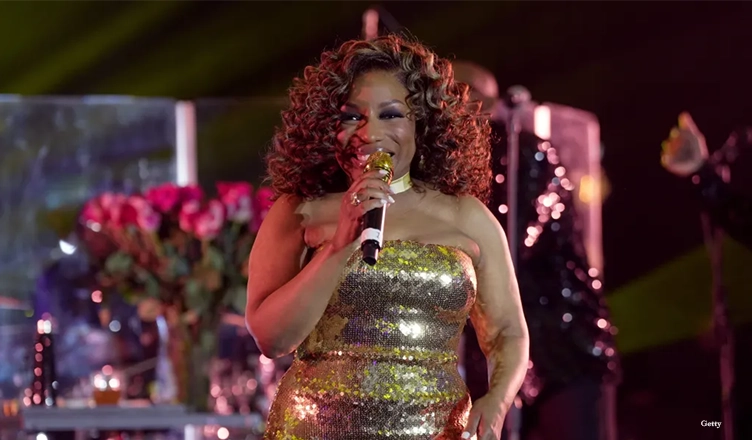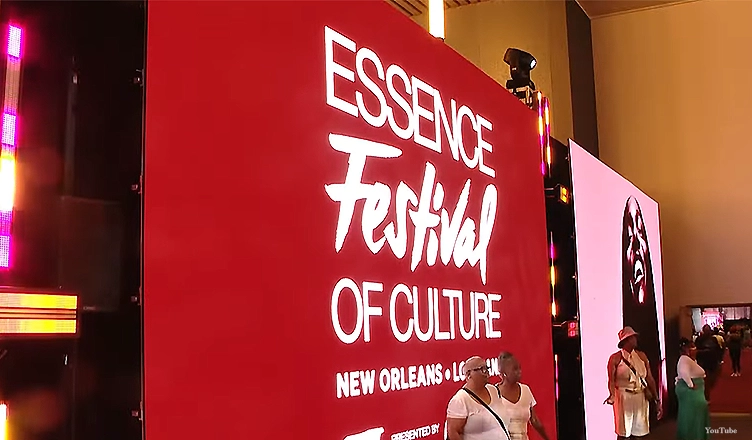The Essence Festival of Culture drew superstar artists, brought fans from distant corners of the country together, and pumped money into the New Orleans economy. But after a string of missteps, attendees are calling for changes.
The festival ran from July 4-6. While it’s been praised for celebrating Black culture, the event also faces backlash and increasing questions.
Eight-time Grammy winner Lauryn Hill performed in a near-empty stadium because of massive delays, and legendary R&B singer Stephanie Mills posted an open letter to organizers on social media, saying her performance was “marred” by “technical difficulties, specifically concerning the sound system.”
Entertainment journalist Kathia Woods covered the festival for the Philadelphia Tribune. In an interview with Urban Hollywood 411 on Friday, Woods questioned why a festival that launched in 1995 is still going through growing pains.
“There’s no reason in year 30 that we’re still having technical issues,” she said.
Related: Essence Festival Responds to Stephanie Mills Criticism With Statement About ‘Power of Love’
Deon Guillory, a journalist in Baton Rouge, Louisiana, is a longtime Essence Fest attendee. This year, he noticed things were off.
“It wasn’t until about May when they announced some of the performances, but you didn’t find out until a month later which night they performed. This information used to be released in February,” Guillory told Urban Hollywood 411.
Those late details may have affected some attendees’ travel plans. Guillory said he noticed the crowds were smaller.
“I did see a lot of empty seats this year, not to the extent as some pictures being shared on social media,” he said. “I do have faith festival organizers will turn things around for next year.”

On July 10, Nola.com published an interview with Richelieu Dennis, executive vice chairman of Sundial Media Group, parent company of Essence Ventures.
Dennis discussed the negative headlines surrounding Essence Fest 2025. “I’ve heard and seen a lot,” he said.
He revealed the festival had fewer corporate sponsors this year because of DEI rollbacks since President Trump returned to the White House.
Plus, as local governments nationwide deal with budget shortfalls, Dennis said the state of Louisiana and the city of New Orleans provided less financial support.
“We believe strongly that the government officials fight hard to get us what they can. Ultimately, though, the festival is a very expensive entity to put on,” Dennis said.
“We need the city and the state funding to keep pace with the increase in costs,” he added.
Asked how much money the festival received from local governments, he said “a little bit more” than $2 million “collectively” from the city and state.
In addition to financial issues, Woods noted that Essence Fest suffered from “poor organization.”
Still, she said there were many highlights, such as when Jill Scott performed on the main stage and brought out fellow Philadelphia natives Patti LaBelle and Jazmine Sullivan.
“We were all singing along,” said Woods.
She also focused her coverage in the Tribune on panels featuring the casts of CBS daytime drama Beyond the Gates, Showtime drama The Chi, and the new National Geographic docuseries Hurricane Katrina: Race Against Time, which looks back 20 years later.

Woods referenced the OWN docuseries Time of Essence (2023) as an explainer on how Essence Fest became an important part of Black culture.
In the series, Essence magazine co-founder Ed Lewis and legendary editor-in-chief Susan L. Taylor said they launched the festival to bring people together “in the second poorest state in the nation.”
Their goal was to create a business opportunity, while celebrating Black music, and offering low-income local residents a chance to attend uplifting free workshops.
A common complaint this year on social media was that the festival “lost its soul” — by pricing out small Black businesses, offering fewer opportunities for emerging music artists to perform, and no longer prioritizing workshops on issues affecting Black women, like health disparities.
Planning was also a major issue.
Last week, Nola.com reported Lauryn Hill was added to this year’s “overstuffed” concert lineup just two days beforehand.
The seven acts before her on Friday night reportedly started late. Because of the delays, the former Fugees member didn’t take the stage at Caesars Superdome until 2:30 a.m. on Saturday. By then, the 83,000 seat Superdome was nearly empty.
Dennis admitted in his interview with Nola.com that festival organizers did not “get it 100% right.”
“So, if you look at the lineup, on some nights there are 10 artists, right? Maybe we don’t need that much. Time goes by faster, there’s less chances for equipment failure,” he said. “Unfortunately, it impacted Miss Lauryn Hill. And then she got blamed for being late. It wasn’t her fault.”
After footage of the mostly-empty stadium went viral, some people on social media blamed Hill — who has a history of being tardy for shows. Others blasted the festival.
The media pounced, with the festival being discussed on urban radio, TikTok, YouTube, and making headlines in print.
Essence posted a statement to Instagram on July 6, saying Hill “arrived on schedule, stepped on that stage, and delivered the kind of performance only a legend can.”
Two days later, the “Ex-Factor” singer took to social media to address “nonsense” surrounding her performance, and thanked Essence “for clarifying that the delays were not my fault.”
Dennis, a haircare mogul from the African nation of Liberia, purchased the Essence Brands from Time Warner in 2018, returning Essence magazine to Black ownership.
Dennis criticized social media users for “celebrating” this year’s lower festival attendance, and attacking him online for continuing a corporate sponsorship with Target despite boycotts against the retailer for rolling back its DEI programs.
“…they’re celebrating online to say, ‘Oh, he didn’t sell as many tickets.’ But think about what the impact is to the community that Essence is serving,” he stated.
Woods pushed back against online critics who’ve been blaming an alleged increase in “African culture” at the festival for the drop in ticket sales. She noted that attendance is down at music festivals nationwide, which CNN reported in June, citing rising operating costs, inflation, and ticket sale competition from touring A-listers like Beyoncé.
As a longtime attendee, Woods suggested Essence return to its roots and place less emphasis on catering to influencers.
Instead, she said Essence should find a better balance as it tries to “appeal to a new generation,” while still offering longtime attendees reasons to keep coming back and spending their money in New Orleans.
Discover more from Urban Hollywood 411
Subscribe to get the latest posts sent to your email.







